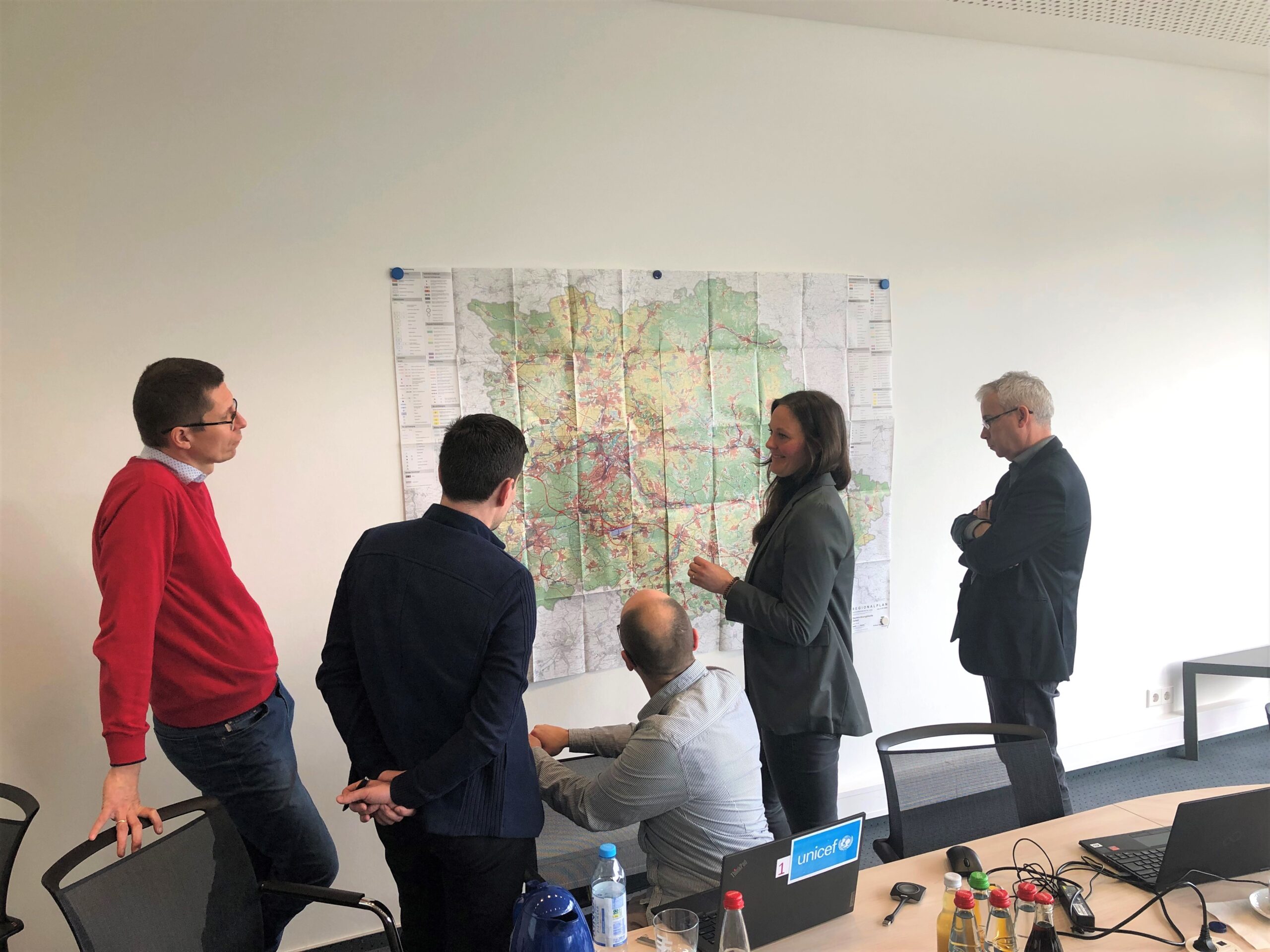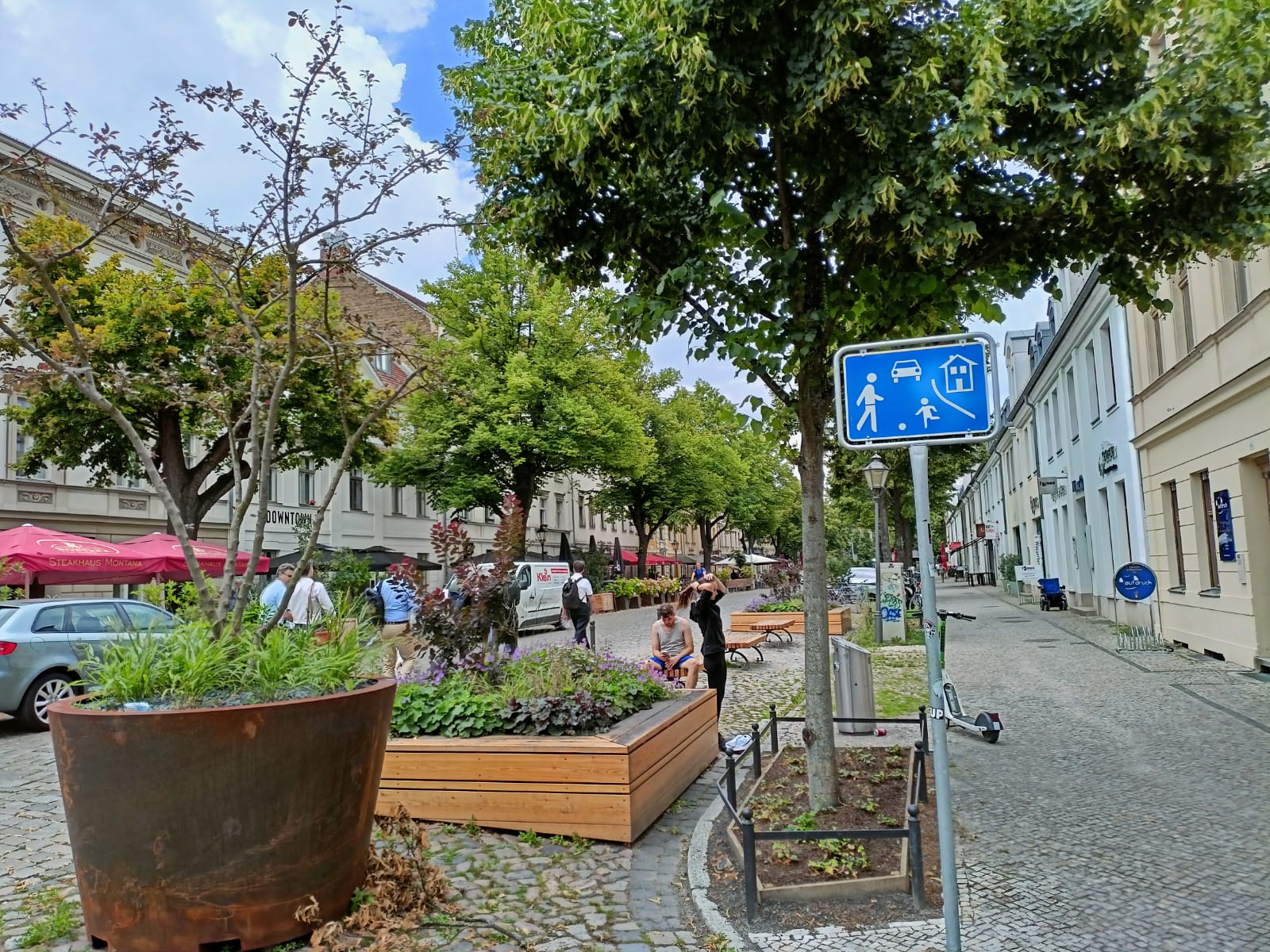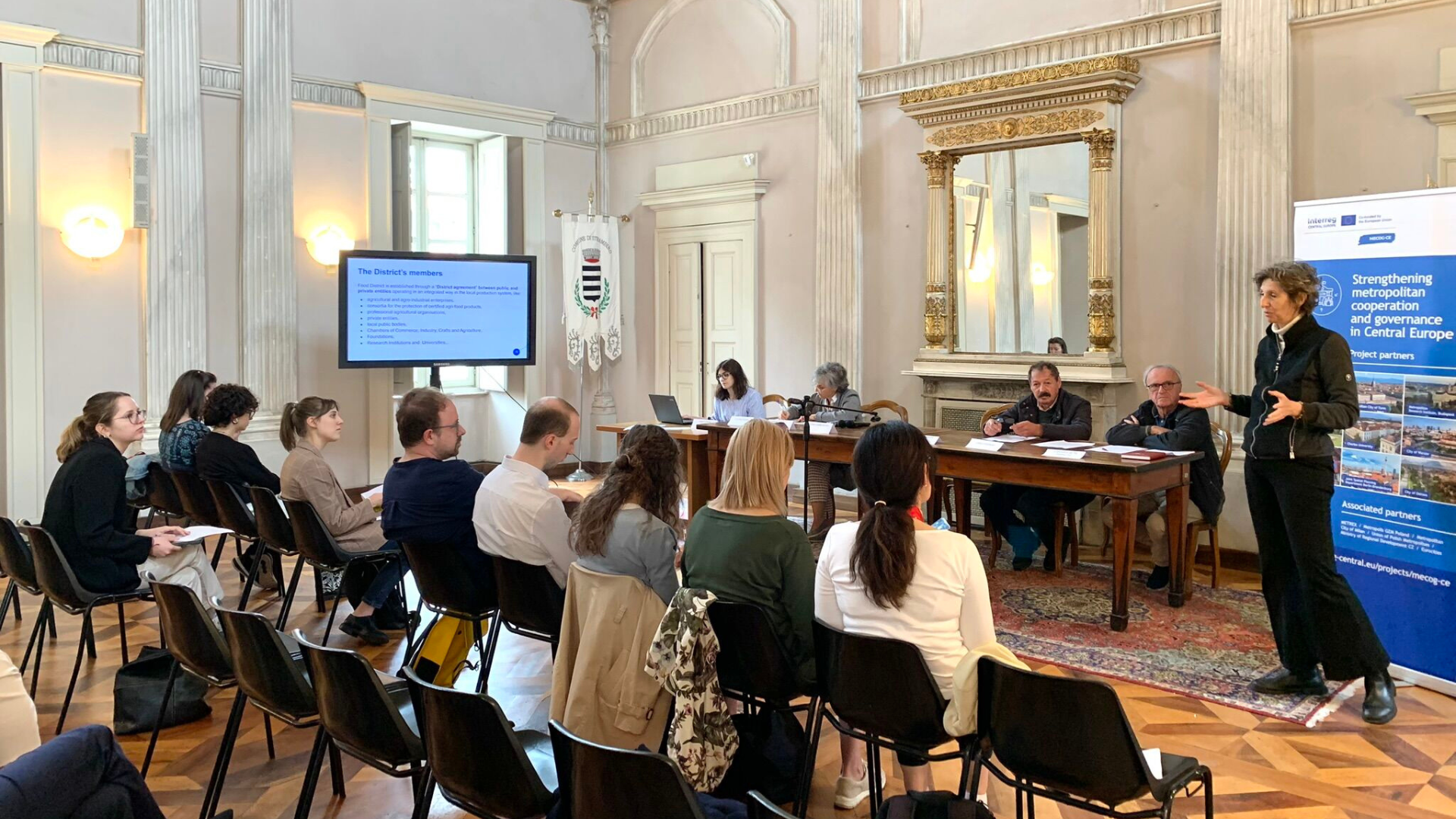The MECOG-CE project leveraged study clusters to explore, share, and adapt best practices for metropolitan cooperation and governance across Central European regions. By forming five thematic clusters, the project promotes cooperation, knowledge exchange, and the development of pilot actions tailored to the unique challenges of each partner’s metropolitan area. Each cluster comprises a lighthouse metropolitan area, serving as an expert supervisor, and follower areas eager to learn and adapt these practices. The article gives an overview of the five clusters and their outcomes. 1. Integrated Public Transport Management The “Strengthening Metropolitan Governance through Integrated Public Transport Management” study cluster enabled detailed examination of the integrated metropolitan transport systems in Stuttgart and Berlin-Brandenburg metropolitan areas, helping the City of Warsaw prepare its pilot action on integrating bus transport in its metropolitan area. Participants examined key aspects like Transit Oriented Development, transport planning tools, regional mobility management, financing, revenue sharing, and legal frameworks. Lessons learned were instrumental in Warsaw’s planning process for a metropolitan bus transport system, with the findings and pilot action forming a basis for its development. The integrated systems proved instrumental in enhancing metropolitan cooperation by actively engaging multiple stakeholders and promoting sustainable mobility for residents across the metropolitan area.  2. Food Districts and Agri-Food Cooperation The “Engagement of metropolitan stakeholders in the agri-food sector through Food Districts” study cluster examined Food Districts as cooperative networks for stakeholders in agri-food production chains. Partners explored how these districts function in Italy – their setup, funding, management, and the role of metropolitan cities, with Turin sharing its experiences in establishing Food District Canavese. The best practice was thoroughly evaluated, highlighting both its strengths and weaknesses. Among its key advantages, the Food District was recognized for its ability to strengthen local production, boost the regional economy, and contribute to environmental protection. However, its primary limitation lies in its reliance on national and regional legislation, which may complicate its implementation and transferability to other contexts. The cluster co-designed a pilot action in the City of Brno to analyse food cooperation potential, engage stakeholders, and map opportunities in its metropolitan area. 3. Joint Opinions and Dialogical Planning The study cluster “Strengthening metropolitan institutionalization through developing joint opinions supporting informal and dialogical planning processes” focused on exchange of knowledge about tools enhancing metropolitan governance, including best practices from the Warsaw Metropolis Association. This helped cluster followers from Berlin-Brandenburg to develop new participation tools and processes for the revision of their Overall Strategic Framework, and informed cluster followers from the City of Brno on joint opinions development and the functioning of the Warsaw Metropolis Association. The study cluster outcomes showed that best practices like development of joint opinions and the organization of workshops can significantly enhance metropolitan governance and promote inclusive participation of metropolitan stakeholders. As a result, these tools serve as a valuable example of good practice that can be easily adapted to other metropolitan areas. Results also contributed to the development of the pilot action in the Capitol Region of Berlin-Brandenburg focusing on the introduction of new dialogical approaches to the planning processes. 4. Semi-Structures and Dialogues for Cooperation The “Semi-structures and dialogues for improvement of metropolitan cooperation” study cluster explored two best practices: the Questionnaire among mayors from the Brno Metropolitan Area and the Municipal Neighbourhood Forum (MNF) from Berlin-Brandenburg metropolitan area. Cluster members explored Brno’s questionnaire gathering opinions from 183 municipalities on metropolitan cooperation, its development, administration, and data processing. Members also studied Berlin-Brandenburg’s MNF, a voluntary bottom-up association among Brandenburg cities, the City of Berlin, and its districts, focusing on its structure, management, and financing. Both practices proved effective for strengthening metropolitan cooperation and governance by fostering dialogue and allowing the sharing of opinions, views, knowledge or experiences between local authorities and other important actors. Both tools contribute to a stronger sense of attachment to the territory and shared purpose. The cluster successfully transferred knowledge about them and supported the pilot action execution by the Metropolitan City of Turin which adapted the Questionnaire to their needs and context.
2. Food Districts and Agri-Food Cooperation The “Engagement of metropolitan stakeholders in the agri-food sector through Food Districts” study cluster examined Food Districts as cooperative networks for stakeholders in agri-food production chains. Partners explored how these districts function in Italy – their setup, funding, management, and the role of metropolitan cities, with Turin sharing its experiences in establishing Food District Canavese. The best practice was thoroughly evaluated, highlighting both its strengths and weaknesses. Among its key advantages, the Food District was recognized for its ability to strengthen local production, boost the regional economy, and contribute to environmental protection. However, its primary limitation lies in its reliance on national and regional legislation, which may complicate its implementation and transferability to other contexts. The cluster co-designed a pilot action in the City of Brno to analyse food cooperation potential, engage stakeholders, and map opportunities in its metropolitan area. 3. Joint Opinions and Dialogical Planning The study cluster “Strengthening metropolitan institutionalization through developing joint opinions supporting informal and dialogical planning processes” focused on exchange of knowledge about tools enhancing metropolitan governance, including best practices from the Warsaw Metropolis Association. This helped cluster followers from Berlin-Brandenburg to develop new participation tools and processes for the revision of their Overall Strategic Framework, and informed cluster followers from the City of Brno on joint opinions development and the functioning of the Warsaw Metropolis Association. The study cluster outcomes showed that best practices like development of joint opinions and the organization of workshops can significantly enhance metropolitan governance and promote inclusive participation of metropolitan stakeholders. As a result, these tools serve as a valuable example of good practice that can be easily adapted to other metropolitan areas. Results also contributed to the development of the pilot action in the Capitol Region of Berlin-Brandenburg focusing on the introduction of new dialogical approaches to the planning processes. 4. Semi-Structures and Dialogues for Cooperation The “Semi-structures and dialogues for improvement of metropolitan cooperation” study cluster explored two best practices: the Questionnaire among mayors from the Brno Metropolitan Area and the Municipal Neighbourhood Forum (MNF) from Berlin-Brandenburg metropolitan area. Cluster members explored Brno’s questionnaire gathering opinions from 183 municipalities on metropolitan cooperation, its development, administration, and data processing. Members also studied Berlin-Brandenburg’s MNF, a voluntary bottom-up association among Brandenburg cities, the City of Berlin, and its districts, focusing on its structure, management, and financing. Both practices proved effective for strengthening metropolitan cooperation and governance by fostering dialogue and allowing the sharing of opinions, views, knowledge or experiences between local authorities and other important actors. Both tools contribute to a stronger sense of attachment to the territory and shared purpose. The cluster successfully transferred knowledge about them and supported the pilot action execution by the Metropolitan City of Turin which adapted the Questionnaire to their needs and context.  5. Metropolitan Prototyping Academies The “Metropolitan Prototyping Academies” study cluster facilitated knowledge transfer from Metropolis GZM to learning metropolitan areas. The academies focus on developing, testing, and evaluating urban space solutions through prototyping, with an emphasis on transferability. Learning metropolitan areas gained comprehensive insights into the methodology, objectives, process steps, stakeholder roles, and potential applications. This enabled them to design preliminary steps for their own processes, identify key stakeholders, and address specific challenges with guidance from Metropolis GZM experts. International collaboration allowed partners from Ostrava and Stuttgart to elaborate their pilot actions focusing on transforming metropolitan territories through participatory approaches. The cluster’s cooperation was helpful, marking a significant milestone in advancing metropolitan innovation and cooperation. Key Outcomes and Benefits The study clusters have played a crucial role in the overall progress of the project. Over several months, project partners actively engaged in mutual learning, focusing on the transfer and adaptation of selected best practices to their territories and local conditions. This collaborative approach enabled a deeper understanding of the specific challenges faced by individual metropolitan areas and facilitated the development of the pilot actions to test and tailor these tools. In upcoming articles, we will provide detailed insights into the successful implementation of these practices.
5. Metropolitan Prototyping Academies The “Metropolitan Prototyping Academies” study cluster facilitated knowledge transfer from Metropolis GZM to learning metropolitan areas. The academies focus on developing, testing, and evaluating urban space solutions through prototyping, with an emphasis on transferability. Learning metropolitan areas gained comprehensive insights into the methodology, objectives, process steps, stakeholder roles, and potential applications. This enabled them to design preliminary steps for their own processes, identify key stakeholders, and address specific challenges with guidance from Metropolis GZM experts. International collaboration allowed partners from Ostrava and Stuttgart to elaborate their pilot actions focusing on transforming metropolitan territories through participatory approaches. The cluster’s cooperation was helpful, marking a significant milestone in advancing metropolitan innovation and cooperation. Key Outcomes and Benefits The study clusters have played a crucial role in the overall progress of the project. Over several months, project partners actively engaged in mutual learning, focusing on the transfer and adaptation of selected best practices to their territories and local conditions. This collaborative approach enabled a deeper understanding of the specific challenges faced by individual metropolitan areas and facilitated the development of the pilot actions to test and tailor these tools. In upcoming articles, we will provide detailed insights into the successful implementation of these practices.
 2. Food Districts and Agri-Food Cooperation The “Engagement of metropolitan stakeholders in the agri-food sector through Food Districts” study cluster examined Food Districts as cooperative networks for stakeholders in agri-food production chains. Partners explored how these districts function in Italy – their setup, funding, management, and the role of metropolitan cities, with Turin sharing its experiences in establishing Food District Canavese. The best practice was thoroughly evaluated, highlighting both its strengths and weaknesses. Among its key advantages, the Food District was recognized for its ability to strengthen local production, boost the regional economy, and contribute to environmental protection. However, its primary limitation lies in its reliance on national and regional legislation, which may complicate its implementation and transferability to other contexts. The cluster co-designed a pilot action in the City of Brno to analyse food cooperation potential, engage stakeholders, and map opportunities in its metropolitan area. 3. Joint Opinions and Dialogical Planning The study cluster “Strengthening metropolitan institutionalization through developing joint opinions supporting informal and dialogical planning processes” focused on exchange of knowledge about tools enhancing metropolitan governance, including best practices from the Warsaw Metropolis Association. This helped cluster followers from Berlin-Brandenburg to develop new participation tools and processes for the revision of their Overall Strategic Framework, and informed cluster followers from the City of Brno on joint opinions development and the functioning of the Warsaw Metropolis Association. The study cluster outcomes showed that best practices like development of joint opinions and the organization of workshops can significantly enhance metropolitan governance and promote inclusive participation of metropolitan stakeholders. As a result, these tools serve as a valuable example of good practice that can be easily adapted to other metropolitan areas. Results also contributed to the development of the pilot action in the Capitol Region of Berlin-Brandenburg focusing on the introduction of new dialogical approaches to the planning processes. 4. Semi-Structures and Dialogues for Cooperation The “Semi-structures and dialogues for improvement of metropolitan cooperation” study cluster explored two best practices: the Questionnaire among mayors from the Brno Metropolitan Area and the Municipal Neighbourhood Forum (MNF) from Berlin-Brandenburg metropolitan area. Cluster members explored Brno’s questionnaire gathering opinions from 183 municipalities on metropolitan cooperation, its development, administration, and data processing. Members also studied Berlin-Brandenburg’s MNF, a voluntary bottom-up association among Brandenburg cities, the City of Berlin, and its districts, focusing on its structure, management, and financing. Both practices proved effective for strengthening metropolitan cooperation and governance by fostering dialogue and allowing the sharing of opinions, views, knowledge or experiences between local authorities and other important actors. Both tools contribute to a stronger sense of attachment to the territory and shared purpose. The cluster successfully transferred knowledge about them and supported the pilot action execution by the Metropolitan City of Turin which adapted the Questionnaire to their needs and context.
2. Food Districts and Agri-Food Cooperation The “Engagement of metropolitan stakeholders in the agri-food sector through Food Districts” study cluster examined Food Districts as cooperative networks for stakeholders in agri-food production chains. Partners explored how these districts function in Italy – their setup, funding, management, and the role of metropolitan cities, with Turin sharing its experiences in establishing Food District Canavese. The best practice was thoroughly evaluated, highlighting both its strengths and weaknesses. Among its key advantages, the Food District was recognized for its ability to strengthen local production, boost the regional economy, and contribute to environmental protection. However, its primary limitation lies in its reliance on national and regional legislation, which may complicate its implementation and transferability to other contexts. The cluster co-designed a pilot action in the City of Brno to analyse food cooperation potential, engage stakeholders, and map opportunities in its metropolitan area. 3. Joint Opinions and Dialogical Planning The study cluster “Strengthening metropolitan institutionalization through developing joint opinions supporting informal and dialogical planning processes” focused on exchange of knowledge about tools enhancing metropolitan governance, including best practices from the Warsaw Metropolis Association. This helped cluster followers from Berlin-Brandenburg to develop new participation tools and processes for the revision of their Overall Strategic Framework, and informed cluster followers from the City of Brno on joint opinions development and the functioning of the Warsaw Metropolis Association. The study cluster outcomes showed that best practices like development of joint opinions and the organization of workshops can significantly enhance metropolitan governance and promote inclusive participation of metropolitan stakeholders. As a result, these tools serve as a valuable example of good practice that can be easily adapted to other metropolitan areas. Results also contributed to the development of the pilot action in the Capitol Region of Berlin-Brandenburg focusing on the introduction of new dialogical approaches to the planning processes. 4. Semi-Structures and Dialogues for Cooperation The “Semi-structures and dialogues for improvement of metropolitan cooperation” study cluster explored two best practices: the Questionnaire among mayors from the Brno Metropolitan Area and the Municipal Neighbourhood Forum (MNF) from Berlin-Brandenburg metropolitan area. Cluster members explored Brno’s questionnaire gathering opinions from 183 municipalities on metropolitan cooperation, its development, administration, and data processing. Members also studied Berlin-Brandenburg’s MNF, a voluntary bottom-up association among Brandenburg cities, the City of Berlin, and its districts, focusing on its structure, management, and financing. Both practices proved effective for strengthening metropolitan cooperation and governance by fostering dialogue and allowing the sharing of opinions, views, knowledge or experiences between local authorities and other important actors. Both tools contribute to a stronger sense of attachment to the territory and shared purpose. The cluster successfully transferred knowledge about them and supported the pilot action execution by the Metropolitan City of Turin which adapted the Questionnaire to their needs and context.  5. Metropolitan Prototyping Academies The “Metropolitan Prototyping Academies” study cluster facilitated knowledge transfer from Metropolis GZM to learning metropolitan areas. The academies focus on developing, testing, and evaluating urban space solutions through prototyping, with an emphasis on transferability. Learning metropolitan areas gained comprehensive insights into the methodology, objectives, process steps, stakeholder roles, and potential applications. This enabled them to design preliminary steps for their own processes, identify key stakeholders, and address specific challenges with guidance from Metropolis GZM experts. International collaboration allowed partners from Ostrava and Stuttgart to elaborate their pilot actions focusing on transforming metropolitan territories through participatory approaches. The cluster’s cooperation was helpful, marking a significant milestone in advancing metropolitan innovation and cooperation. Key Outcomes and Benefits The study clusters have played a crucial role in the overall progress of the project. Over several months, project partners actively engaged in mutual learning, focusing on the transfer and adaptation of selected best practices to their territories and local conditions. This collaborative approach enabled a deeper understanding of the specific challenges faced by individual metropolitan areas and facilitated the development of the pilot actions to test and tailor these tools. In upcoming articles, we will provide detailed insights into the successful implementation of these practices.
5. Metropolitan Prototyping Academies The “Metropolitan Prototyping Academies” study cluster facilitated knowledge transfer from Metropolis GZM to learning metropolitan areas. The academies focus on developing, testing, and evaluating urban space solutions through prototyping, with an emphasis on transferability. Learning metropolitan areas gained comprehensive insights into the methodology, objectives, process steps, stakeholder roles, and potential applications. This enabled them to design preliminary steps for their own processes, identify key stakeholders, and address specific challenges with guidance from Metropolis GZM experts. International collaboration allowed partners from Ostrava and Stuttgart to elaborate their pilot actions focusing on transforming metropolitan territories through participatory approaches. The cluster’s cooperation was helpful, marking a significant milestone in advancing metropolitan innovation and cooperation. Key Outcomes and Benefits The study clusters have played a crucial role in the overall progress of the project. Over several months, project partners actively engaged in mutual learning, focusing on the transfer and adaptation of selected best practices to their territories and local conditions. This collaborative approach enabled a deeper understanding of the specific challenges faced by individual metropolitan areas and facilitated the development of the pilot actions to test and tailor these tools. In upcoming articles, we will provide detailed insights into the successful implementation of these practices.